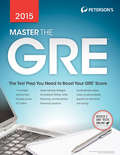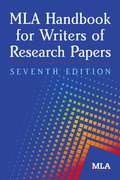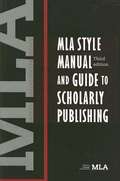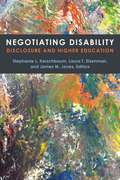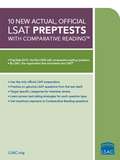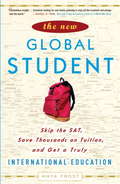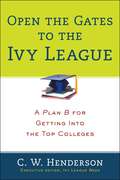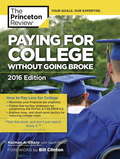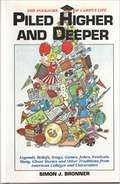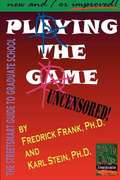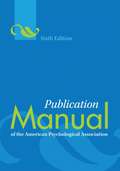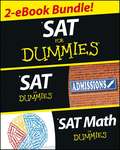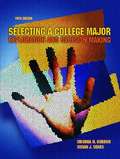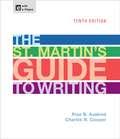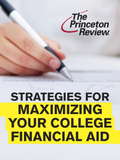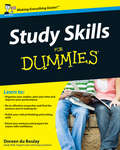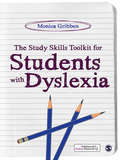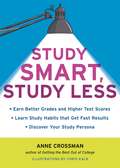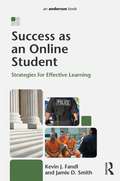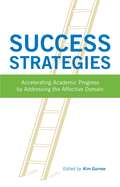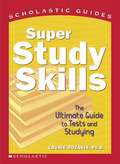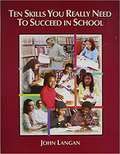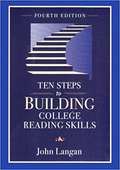Special Collections
Student Resources
- Table View
- List View
Master the GRE 2015
by Margaret MoranPeterson's Master the GRE® 2015 is your one-stop guidebook for preparing for the GRE test. This comprehensive eBook is organized into six parts that include basic information about the test, a diagnostic and three practice tests, and detailed test prep for the Analytical Writing, Verbal Reasoning, and Quantitative Reasoning sections of the GRE. Inside you'll find 7 full-length practice tests, including access to 3 online, with detailed answer explanations and a thorough review of all GRE® General Test subject areas: Analytical Writing, Verbal Reasoning, and Quantitative Reasoning. Also included is expert advice on GRE® question formats, scoring, and what to expect on test day. Additional resources include valuable guidance to help you score high on the Argument and Issue Task essays, helpful tips for using the on-screen calculator and answering numeric entry questions strategies--everything you need to boost your GRE score.
MLA Handbook for Writers of Research Papers (7th edition)
by Joseph GibaldiThe seventh edition of the MLA Handbook is a comprehensive, up-to-date guide to research and writing in the online environment. It provides an authoritative update of MLA documentation style.
MLA Style Manual and Guide to Scholarly Publishing (3rd Edition)
by The Modern Language Association of AmericaA complete, up-to-date guide for writing scholarly texts, documenting research sources, submitting manuscripts to publishers, and dealing with legal issues surrounding publication.
Negotiating Disability
by Stephanie L Kerschbaum and Laura T Eisenman and James M JonesDisability is not always central to claims about diversity and inclusion in higher education, but should be. This collection reveals the pervasiveness of disability issues and considerations within many higher education populations and settings, from classrooms to physical environments to policy impacts on students, faculty, administrators, and staff. While disclosing one’s disability and identifying shared experiences can engender moments of solidarity, the situation is always complicated by the intersecting factors of race and ethnicity, gender, sexuality, and class. With disability disclosure as a central point of departure, this collection of essays builds on scholarship that highlights the deeply rhetorical nature of disclosure and embodied movement, emphasizing disability disclosure as a complex calculus in which degrees of perceptibility are dependent on contexts, types of interactions that are unfolding, interlocutors’ long- and short-term goals, disabilities, and disability experiences, and many other contingencies.
New Actual, Official LSAT Preptests with Comparative Reading
by Law School Admission CouncilThis essential LSAT preparation tool encompasses PrepTest 52 (the September 2007 LSAT) through PrepTest 61 (the October 2010 LSAT).
The New Global Student
by Maya FrostGood-bye, Old School. Hello, Bold School!In 2005, Maya Frost and her husband sold everything and left their suburban American lifestyle behind in order to have an adventure abroad. The tricky part: they had to shepherd their four teenage daughters through high school and into college. This hilarious and conspiratorial how-to handbook describes the affordable, accessible, and stunningly advantageous options they stumbled upon that any American student can leverage to get an outrageously relevant global education. Ready to ditch the drama of the traditional hypercompetitive SAT/AP/GPA path? Meet the bold American students who are catapulting into the global economy at twenty with a red-hot college diploma, sizzling 21st-century skills, a blazing sense of direction–and no debt. You’ll discover: • the one thing preventing your student from blasting forward• why Advanced Placement isn’t so advanced• why international programs fail to provide a truly global education• the most critical time for your student to study abroad• the best exchange program in the world ($3,000 or less per year)• the strategic way to fast-forward through high school• how to maximize a family sabbatical • how to live the life of your dreams abroad–and save thousands for collegePacked with myth-busting facts, laughable loopholes, insider insights, astonishing success stories, and poignant tales from the Frost daughters themselves, this inspiring romp is guaranteed to get you cheering.
Open the Gates to the Ivy League
by C. W. HendersonThe only guide to college admissions that offers an alternative gateway to getting into the USA's top-rated schools. Ivy League schools on average reject about 90 percent of applicants. But there is another way to gain admittance to the top colleges in the U. S. -a back gateway. This guide is a Plan B that uncovers alternative, and often less expensive, ways for getting into the eight universities of the Ivy League proper, as well as the so-called second tier. Some of these back gateways are virtually unknown and all but secret, while others are just under used.
Paying for College Without Going Broke, 2014 Edition
by Princeton Review and Kalman ChanyThe only annual college financial aid guide with line-by-line instructions for completing the FAFSA and CSS PROFILE aid forms!As seen in USA TODAY, the Wall Street Journal, Money, and the Los Angeles Times, Paying for College Without Going Broke will help you: * Calculate the actual costs of college * Increase your chances of receiving aid * Compare aid offers and learn how to appeal if needed * Plan strategically as an independent student or divorced or single parent * Understand long- and short-term money-saving tactics * Avoid costly mistakes when applying Paying for College Without Going Broke includes a foreword by Bill Clinton, as well as in-depth line-by-line strategies for filling out 2014-2015 aid forms, including the required federal FAFSA form. The eBook version of this popular guide includes links to downloadable PDFs of the sample forms and worksheets that appear in the book so that you can print them for reference, if desired. (Sample forms and worksheets can be printed directly from devices that support direct printing, or via the desktop app version of your device.)
Piled Higher and Deeper
by Simon J. BronnerAs suggested by the subtitle, "Legends, Beliefs, Songs, Games, Jokes, Festivals, Slang Ghost Stories and Other Traditions from American Colleges and Universities," Bronner examines every aspect of modern college life. That includes study techniques like mnemonics to help remember complex facts, traditions like waiting times for professors arriving late to class, legendary professors, photocopier art, mooning, streaking, celebrations, pranks, drinking games and songs, fight songs, ghost stories, and competitive college humor (including many Texas Aggie jokes). A section on sororities and fraternities covers rush, pledging, hell week, initiation, and numerous traditions. Even dating, engagement, and slang terms get some coverage. This book will be of greatest interest to those who study folklore and traditions, to new students seeking to learn what to expect in college, and perhaps to those who want to adapt old traditions to their school or its organizations.
Publication Manual of the American Psychological Association (6th Edition)
by American Psychological AssociationThe style manual of choice for writers, editors, students, and educators in the social and behavioral sciences, this updated "Publication Manual" provides invaluable guidance on all aspects of the writing process, from the ethics of authorship to the word choice that best reduces bias.
Reducing Barriers to Training of Blind Graduate Students in Psychology
by Heidi JoshiTo increase the number of psychologists with visual impairments, all levels of the pipeline, from graduate training through practica and internship, need to be accessible to this population. This study sought to determine the types of barriers students who are blind face in their psychology graduate programs. The areas explored in the study included accessing printed materials throughout participants graduate process, administering and scoring test protocols, accessing sources for research, and obtaining campus-wide communications. Attitudinal barriers were also explored in this study, particularly from supervisors, instructors, and peers. There is very little research in this area and as a result, this study was designed to elucidate the experiences of participants with visual impairments in their graduate programs. One goal was to give training institutions a better understanding of the barriers faced by students who are blind. Nineteen participants were interviewed using a semi-structured questionnaire consisting of yes/no and open-ended questions. Descriptive statistics were utilized in order to obtain the major themes of the responses. The most universal barrier related to the plethora of printed material encountered in graduate training. Nearly all of the participants discussed difficulties in obtaining printed material in alternate formats. They especially found it difficult to get enough sources in a timely manner for their research. Participants discussed missing class changes or other important details due to this information being posted in print and not accessible to them. Attitudes were a second barrier frequently encountered. Participants stated that they had to contend with the prejudicial attitudes of supervisors, professors, and peers who were meant to assist them in their process. Participants also discussed their wish to have more disability related awareness and education activities implemented in the curriculum of their graduate institutions. This would assist these institutions in overcoming the attitudinal barriers experienced by their students who were blind. However, participants also discussed supportive factors such as partners and professors who would provide appropriate classroom accommodations. Despite the over thirty years since passage of the rehabilitation act, and the fourteen years since the implementation of the American with Disabilities Act. Results indicate that numerous barriers still exist for graduate psychology students who are blind. These barriers must be aggressively addressed for persons who are blind to be afforded equal access to training in psychology.
SAT Bundle For Dummies
by Geraldine Woods and Peter Bonfanti and Kristin Josephson and Mark ZegarelliTwo complete ebooks for one low price! Created and compiled by the publisher, this SAT bundle brings together two of the bestselling For Dummies SAT guides in one, e-only bundle. With this special bundle, you'll get the complete text of the following titles: SAT For Dummies, 8th Edition Whether you are a student struggling with math, reading, or writing essays, this updated edition of SAT For Dummies offers advice for tackling the toughest questions, as well as hints and tips for making the most of the time available to complete each section. SAT For Dummies is packed with 5 full-length practice tests with detailed answers and explanations, review of foundational concepts for every section, from identifying root words and using commas correctly to solving math word problems and using the quadratic formula. SAT For Dummies gives you the edge you need to successfully achieve the highest score possible! SAT Math For Dummies Scoring well on the mathematics section of the SAT exam isn't guaranteed by getting good grades in Algebra and Geometry. Turn to SAT Math For Dummies for expert advice on translating your classroom success into top scores. Loaded with test-taking strategies, two practice tests, and hundreds of problems with detailed solutions and explanations, SAT Math For Dummies helps you maximize your scores in no time About the Authors of SAT For Dummies, 8th Edition Geraldine Woods has prepared students for the SAT, both academically and emotionally, for the past three decades. She also teaches English and directs the independent-study program at the Horace Mann School in New York City. She is the author of more than 50 books, including English Grammar For Dummies, 2nd Edition; English Grammar Workbook For Dummies, 2nd Edition; Grammar Essentials For Dummies; Research Papers For Dummies; College Admission Essays For Dummies; AP English Literature and AP English Language & Composition For Dummies, all published by Wiley. She lives in New York City with her husband and two parakeets. Peter Bonfanti has taught high school math in New York City since 1996. Before that, he lived in Pennsylvania and was a monk. Before that, he went to school in New Jersey, where he was born and hopes to return someday. Kristin Josephson survived the college admissions process only to drop out of MIT 16 months later to attend circus school in San Francisco. While there, she studied flying trapeze, trampoline, and acrobatics. Kristin discovered her passion for teaching while she was tutoring in the Bay Area, a passion that led her to complete her degree at Colorado College. Kristin eventually landed at the Horace Mann School, where she has been teaching high school mathematics since 2007 About the Author of SAT Math For Dummies Mark Zegarelli holds degrees in math and English from Rutgers University. He is a math tutor and writer with over 25 years of professional experience. Zegarellli has written numerous Dummies books, including LSAT Logic Games For Dummies and Basic Math & Pre-Algebra Workbook For Dummies
Selecting A College Major
by Virginia N. Gordon and Susan J. SearsThis innovative text simplifies the process of choosing a major from a sometimes overwhelming array of majors and related career fields. It will assist not only the "undecided" student with selecting a major, but also the "major-changer" who is exploring alternative options. A step-by-step process leads students through personal and academic assessment as well as occupational information searches. Through thought-provoking activities, they can explore their academic, career, and personal interests and goals. Students can investigate academic majors from many perspectives, including a search of majors in general, majors on their campus, and majors based on their academic and occupational interests. Highlights of this text include: *A Natural Decision-Making Progression. Students are directly and personally involved in activities that involve exploration, reflection, and choice. *Extensive Major Exploration. Three distinct approaches help students narrow their list to realistic alternatives. *Incorporation of Academic and Career Interests, Abilities, and Values. Self-assessment gives students information on which to base their choice of a major. *Formulation of a Graduation Plan. Students use their academic transcripts to summarize all they have learned and develop a plan for the future. Features include: *Majors Exploration *Career Advice *Web Links *Tips from Successful Students *Student Bulletin Boards *Faculty Resources
The St. Martin's Guide to Writing (Tenth Edition)
by Rise B. Axelrod and Charles R. CooperThe best-selling college rhetoric for over 25 years, The St. Martin's Guide has achieved an unmatched record of success by providing practical innovations for the ever-changing composition course. The acclaimed step-by-step Guides to Writing offer sure-fire invention strategies to get students started, sentence strategies to get and keep students writing, and thoughtful revision strategies to help students make their writing their own. With more hands-on activities for critical reading and working with sources, greater emphasis on the rhetorical situation, a revamped design that helps students see what they need to do at a glance, and a greater variety of formats (cloth, paper, loose-leaf, and e-books), the Guide is better than ever. The print text is now integrated with e-Pages for The St. Martin's Guide, designed to take advantage of what the Web can do.
Strategies for Maximizing Your College Financial Aid
by Princeton Review and Kalman ChanyFiguring out how to pay for college can be daunting. Fortunately, Strategies for Maximizing Your College Financial Aid provides much-needed expert advice for understanding the financial aid process, managing student loans, and getting the most money for college. In this succinct guide, financial aid consultant Kal Chany and the experts at the Princeton Review present a concise but comprehensive overview of college financial aid. Inside, you'll find guidance to demystify the aid process, and information that will help you: · debunk financial aid myths · figure out financial aid terminology · evaluate financial aid packages and awards · understand grants, scholarships, student loans, work-study, and other forms of aid · fill out the FAFSA (Free Application for Federal Student Aid), CSS/PROFILE, and other financial aid forms · choose a college with financial aid in mind · get started on saving for school
Students with Learning Disabilities at Graduate and Professional School
by Stanley J. AntonoffThis comprehensive text examines strategies to help students with learning and attentional disabilities get the most out of their graduate school experience.
Study Skills For Dummies
by Doreen Du BoulayStudents need to learn to manage their time, organise their studies, understand, learn, and convey a lot of information - and they need to learn to do it quickly. Whether you're fresh out of school, or a mature student returning to education, you now don't need to feel alone!With Study Skills For Dummies, you'll be given the know-how and confidence to achieve consistent results every time - and a lack of preparation will become a thing of the past.Discover how to excel at:Note-taking, speed-reading and essay-writingImproving your memory, critical thinking and analysisUsing the internet to supplement studyExam skills and developing the best learning strategy to fit your specific needs and abilities
The Study Skills Toolkit for Students with Dyslexia
by Monica Gribben'This toolkit is the student's safety net offering user friendly, down to earth advice and real life skills that have been tried and tested by the author'-Dr John Schneider, Educational Psychologist, Edinburgh 'This is exactly how I felt starting university ... a wonderful and very helpful book full of interesting and useful hints and tips on how to survive university as a dyslexic student. It doesn't make you feel silly or stupid but makes you feel you can achieve what you set out to do'-Sharon Patterson, Adult Nursing student, Edinburgh Napier University 'You realize you're in the hands of a professional who has taught thousands of students how to succeed at university'-Holly Pellicer, Dyslexia Advisor, University of Oslo Packed with helpful advice, checklists and templates, this book will help you improve your study skills throughout your time at university. Written in a straightforward, no- nonsense style, the guidance can be broken down into manageable chunks. Issues covered include: - procrastination - planning your assignment - understanding your essay question - researching, writing and referencing your written work - managing your own well-being. Drawing on years of experience running study skills workshops in higher education, Monica Gribben has written an accessible book for students with dyslexia that shows how to work through the challenges that studying presents. The companion Website www.sagepub.co.uk/gribben has podcasts, worksheets and electronic resources to support each chapter. Monica Gribben is a private dyslexia consultant and Dyslexia Adviser at Edinburgh Napier University.
Study Smart, Study Less
by Anne CrossmanReap the rewards of a higher GPA without sacrificing your sanity or your social life! If "I studied all night and I still didn't ace the test" is your mantra, this witty study guide will help you pinpoint your personal learning style, prevent study mishaps, and work to your strengths. Using the best research on memory and the brain, Study Smart, Study Less offers easy techniques to help you: * absorb info quickly* remember it accurately* create a successful study space * put together a productive study group * use interactive games to master tough material* identify pitfalls--and avoid falling into them * and stop overstudying (no--this isn't a typo) By learning how to learn, you'll not only feel smarter, you'll be smarter.From the Trade Paperback edition.
Success as an Online Student
by Kevin J. Fandl and Jamie D. SmithThis book presents concise guidance to make the online learning journey enjoyable, productive, and most of all, worthwhile.
Success Strategies
by Kim GurneeThe book presents fourteen success strategies in a concise format and helps students cultivate the mindset that focuses on growth.
Super Study Skills
by Laurie RozakisFrom the Book jacket: Knowing how to study is important if you want to do your best in school. Super Study Skills: The Ultimate Guide to Tests and Studying has the helpful tips all students need to become more successful. Super Study Skills will show you how to * Study smarter to get the grades you want * Take tests with confidence * Get organized * Use your time more efficiently * Take great notes * Improve your reading comprehension * Reduce test jitters Plus Super Study Skills offers tips for taking specific kinds of tests, including true/false, essay, multiple choice, and more. Whether you are preparing for a standardized test, getting ready for a classroom quiz, or trying to improve your grades, Super Study Skills can help you reach your goals.
Ten Skills You Really Need to Succeed in School
by John LanganA guidebook to the essential skills necessary for students to make the transition from high school to college.
Ten Steps to Building College Reading Skills (4th edition)
by John LanganWe all know that many students entering college today do not have the reading skills needed to do effective work in their courses. A related problem, apparent even in class discussions, is that students often lack the skills required to think in a clear and logical way. The purpose of Ten Steps to Building College Reading Skills is to develop effective reading and clear thinking.
